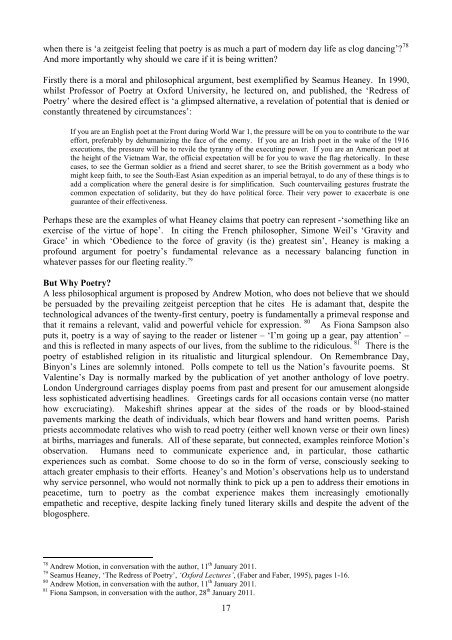Where are the war poets? - Defence Academy of the United Kingdom
Where are the war poets? - Defence Academy of the United Kingdom
Where are the war poets? - Defence Academy of the United Kingdom
You also want an ePaper? Increase the reach of your titles
YUMPU automatically turns print PDFs into web optimized ePapers that Google loves.
when <strong>the</strong>re is ‘a zeitgeist feeling that poetry is as much a part <strong>of</strong> modern day life as clog dancing’ 78<br />
And more importantly why should we c<strong>are</strong> if it is being written<br />
Firstly <strong>the</strong>re is a moral and philosophical argument, best exemplified by Seamus Heaney. In 1990,<br />
whilst Pr<strong>of</strong>essor <strong>of</strong> Poetry at Oxford University, he lectured on, and published, <strong>the</strong> ‘Redress <strong>of</strong><br />
Poetry’ where <strong>the</strong> desired effect is ‘a glimpsed alternative, a revelation <strong>of</strong> potential that is denied or<br />
constantly threatened by circumstances’:<br />
If you <strong>are</strong> an English poet at <strong>the</strong> Front during World War 1, <strong>the</strong> pressure will be on you to contribute to <strong>the</strong> <strong>war</strong><br />
effort, preferably by dehumanizing <strong>the</strong> face <strong>of</strong> <strong>the</strong> enemy. If you <strong>are</strong> an Irish poet in <strong>the</strong> wake <strong>of</strong> <strong>the</strong> 1916<br />
executions, <strong>the</strong> pressure will be to revile <strong>the</strong> tyranny <strong>of</strong> <strong>the</strong> executing power. If you <strong>are</strong> an American poet at<br />
<strong>the</strong> height <strong>of</strong> <strong>the</strong> Vietnam War, <strong>the</strong> <strong>of</strong>ficial expectation will be for you to wave <strong>the</strong> flag rhetorically. In <strong>the</strong>se<br />
cases, to see <strong>the</strong> German soldier as a friend and secret sh<strong>are</strong>r, to see <strong>the</strong> British government as a body who<br />
might keep faith, to see <strong>the</strong> South-East Asian expedition as an imperial betrayal, to do any <strong>of</strong> <strong>the</strong>se things is to<br />
add a complication where <strong>the</strong> general desire is for simplification. Such countervailing gestures frustrate <strong>the</strong><br />
common expectation <strong>of</strong> solidarity, but <strong>the</strong>y do have political force. Their very power to exacerbate is one<br />
guarantee <strong>of</strong> <strong>the</strong>ir effectiveness.<br />
Perhaps <strong>the</strong>se <strong>are</strong> <strong>the</strong> examples <strong>of</strong> what Heaney claims that poetry can represent -‘something like an<br />
exercise <strong>of</strong> <strong>the</strong> virtue <strong>of</strong> hope’. In citing <strong>the</strong> French philosopher, Simone Weil’s ‘Gravity and<br />
Grace’ in which ‘Obedience to <strong>the</strong> force <strong>of</strong> gravity (is <strong>the</strong>) greatest sin’, Heaney is making a<br />
pr<strong>of</strong>ound argument for poetry’s fundamental relevance as a necessary balancing function in<br />
whatever passes for our fleeting reality. 79<br />
But Why Poetry<br />
A less philosophical argument is proposed by Andrew Motion, who does not believe that we should<br />
be persuaded by <strong>the</strong> prevailing zeitgeist perception that he cites He is adamant that, despite <strong>the</strong><br />
technological advances <strong>of</strong> <strong>the</strong> twenty-first century, poetry is fundamentally a primeval response and<br />
that it remains a relevant, valid and powerful vehicle for expression. 80 As Fiona Sampson also<br />
puts it, poetry is a way <strong>of</strong> saying to <strong>the</strong> reader or listener – ‘I’m going up a gear, pay attention’ –<br />
and this is reflected in many aspects <strong>of</strong> our lives, from <strong>the</strong> sublime to <strong>the</strong> ridiculous. 81 There is <strong>the</strong><br />
poetry <strong>of</strong> established religion in its ritualistic and liturgical splendour. On Remembrance Day,<br />
Binyon’s Lines <strong>are</strong> solemnly intoned. Polls compete to tell us <strong>the</strong> Nation’s favourite poems. St<br />
Valentine’s Day is normally marked by <strong>the</strong> publication <strong>of</strong> yet ano<strong>the</strong>r anthology <strong>of</strong> love poetry.<br />
London Underground carriages display poems from past and present for our amusement alongside<br />
less sophisticated advertising headlines. Greetings cards for all occasions contain verse (no matter<br />
how excruciating). Makeshift shrines appear at <strong>the</strong> sides <strong>of</strong> <strong>the</strong> roads or by blood-stained<br />
pavements marking <strong>the</strong> death <strong>of</strong> individuals, which bear flowers and hand written poems. Parish<br />
priests accommodate relatives who wish to read poetry (ei<strong>the</strong>r well known verse or <strong>the</strong>ir own lines)<br />
at births, marriages and funerals. All <strong>of</strong> <strong>the</strong>se separate, but connected, examples reinforce Motion’s<br />
observation. Humans need to communicate experience and, in particular, those cathartic<br />
experiences such as combat. Some choose to do so in <strong>the</strong> form <strong>of</strong> verse, consciously seeking to<br />
attach greater emphasis to <strong>the</strong>ir efforts. Heaney’s and Motion’s observations help us to understand<br />
why service personnel, who would not normally think to pick up a pen to address <strong>the</strong>ir emotions in<br />
peacetime, turn to poetry as <strong>the</strong> combat experience makes <strong>the</strong>m increasingly emotionally<br />
empa<strong>the</strong>tic and receptive, despite lacking finely tuned literary skills and despite <strong>the</strong> advent <strong>of</strong> <strong>the</strong><br />
blogosphere.<br />
78 Andrew Motion, in conversation with <strong>the</strong> author, 11 th January 2011.<br />
79 Seamus Heaney, ‘The Redress <strong>of</strong> Poetry’, ‘Oxford Lectures’, (Faber and Faber, 1995), pages 1-16.<br />
80 Andrew Motion, in conversation with <strong>the</strong> author, 11 th January 2011.<br />
81 Fiona Sampson, in conversation with <strong>the</strong> author, 28 th January 2011.<br />
17

















